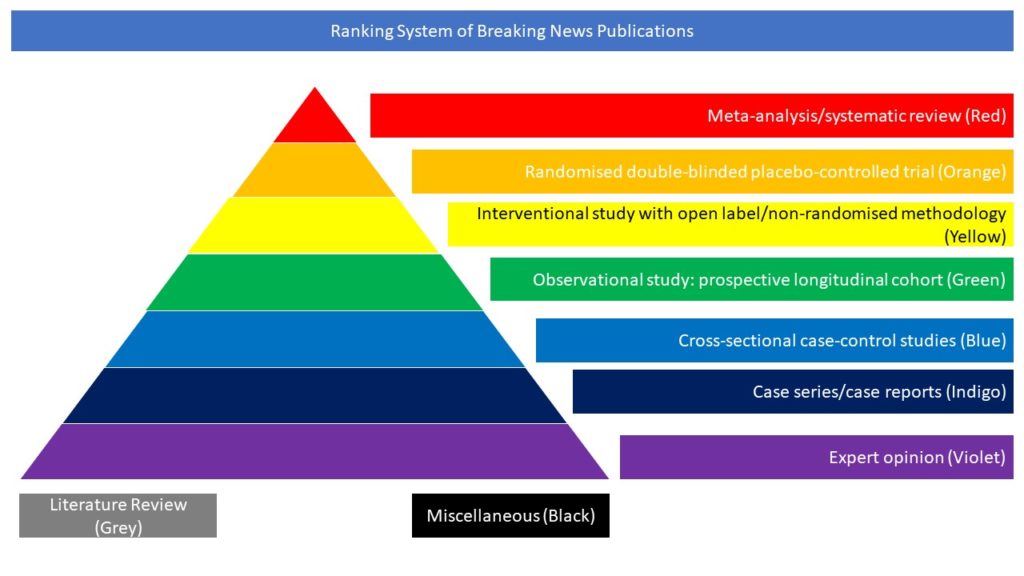Observational studies: prospective longitudinal cohort (Green)
Read on for our highlighted selection of Covid-related obeservational studies from the scientific press for January 2022:
- Disorders of Consciousness Associated With COVID-19: A Prospective, Multimodal Study of Recovery and Brain Connectivity
- Recovery From COVID-19 in Multiple Sclerosis A Prospective and Longitudinal Cohort Study of the United Kingdom Multiple Sclerosis Register
- Cognitive sequelae of long COVID may not be permanent. A prospective study
- Interferon Beta-1a treatment promotes SARS-CoV-2 mRNA vaccine response in multiple sclerosis subjects
Disorders of Consciousness Associated With COVID-19: A Prospective, Multimodal Study of Recovery and Brain Connectivity
In patients with severe coronavirus disease 2019 (COVID-19), disorders of consciousness (COVID-DoC) have emerged as a serious complication. The prognosis and pathophysiology of COVID-DoC remain unclear, complicating decisions about continuing life-sustaining treatment. In this prospective, longitudinal study the authors describe the natural history of COVID-DoC and investigate its associated brain connectivity profile. They screened consecutive patients with COVID-19 and enrolled critically ill adult patients with a DoC unexplained by sedation or structural brain injury, and who were planned to undergo a brain MRI. They performed resting state functional MRI and diffusion MRI to evaluate functional and structural connectivity, as compared to healthy controls and patients with DoC resulting from severe traumatic brain injury (TBI). they assessed the recovery of consciousness (command-following) and functional outcomes (Glasgow Outcome Scale Extended [GOSE] and the Disability Rating Scale [DRS]) at hospital discharge, three months post-discharge, and six months post-discharge. They also explored whether clinical variables were associated with recovery from COVID-DoC. After screening 1,105 patients with COVID-19, the authors enrolled twelve with COVID-DoC. The median age was 63.5 years [interquartile range 55-76.3]. Excluding one who died shortly after enrollment, all of the remaining eleven patients recovered consciousness, after 0-25 days (median 7 [5-14.5]) following the cessation of continuous intravenous sedation. At discharge, all surviving patients remained dependent – median GOSE 3 [1-3], median DRS 23 [16-30]. However ultimately, except for two patients with severe polyneuropathy, all returned home with normal cognition and minimal disability – at three months, median GOSE 3 [3-3], median DRS 7 [5-13]; at six months, median GOSE 4 [4-5], median DRS 3 [3-5]. Ten patients with COVID-DoC underwent advanced neuroimaging; functional and structural brain connectivity in COVID-DoC was diminished compared to healthy controls, and structural connectivity was comparable to patients with severe TBI. The authors concluded that patients who survived invariably recovered consciousness after COVID-DoC. Though disability was common following hospitalization, functional status improved over the ensuing months.
David Fischer, Samuel B Snider, Megan E Barra, William R Sanders, Otto Rapalino, Pamela Schaefer, Andrea S. Foulkes, Yelena G Bodien, Brian L Edlow. Disorders of Consciousness Associated With COVID-19: A Prospective, Multimodal Study of Recovery and Brain Connectivity. Neurology Dec 2021, 10.1212/WNL.0000000000013067; DOI: 10.1212/WNL.0000000000013067.
Recovery From COVID-19 in Multiple Sclerosis A Prospective and Longitudinal Cohort Study of the United Kingdom Multiple Sclerosis Register
The objective of this study was to understand the course of recovery from coronavirus disease 2019 (COVID-19) among patients with multiple sclerosis (MS) and to determine its predictors, including patients’ pre–COVID-19 physical and mental health status. This prospective and longitudinal cohort study recruited patients with MS who reported COVID-19 from March 17, 2020, to March 19, 2021, as part of the United Kingdom MS Register (UKMSR) COVID-19 study. Participants used online questionnaires to regularly update their COVID-19 symptoms, recovery status, and duration of symptoms for those who fully recovered. Questionnaires were date stamped for estimation of COVID-19 symptom duration for those who had not recovered at their last follow-up. The UKMSR holds demographic and up-to-date clinical data on participants as well as their web-based Expanded Disability Status Scale (web-EDSS) and Hospital Anxiety and Depression Scale (HADS) scores. The association between these factors and recovery from COVID-19 was assessed using multivariable Cox regression analysis. Of the 7,977 patients with MS who participated in the UKMSR COVID-19 study, 599 reported COVID-19 and prospectively updated their recovery status. Twenty-eight hospitalized participants were excluded. At least 165 participants (29.7%) had long-standing COVID-19 symptoms for ≥4 weeks and 69 (12.4%) for ≥12 weeks. Participants with pre–COVID-19 web-EDSS scores ≥7, participants with probable anxiety and/or depression (HADS scores ≥11) before COVID-19 onset, and women were less likely to report recovery from COVID-19. The authors concluded that patients with MS are affected by postacute sequelae of COVID-19. Preexisting severe neurologic impairment or mental health problems appear to increase this risk. These findings can have implications in tailoring their post–COVID-19 rehabilitation.
Garjani A, Middleton RM, Nicholas R, Evangelou N. Recovery From COVID-19 in Multiple Sclerosis: A Prospective and Longitudinal Cohort Study of the United Kingdom Multiple Sclerosis Register. Neurol Neuroimmunol Neuroinflamm. 2021 Nov 30;9(1):e1118. doi: 10.1212/NXI.0000000000001118.
Cognitive sequelae of long COVID may not be permanent. A prospective study
Cognitive decline is a recognized manifestation of long COVID, even among patients who experienced mild disease. However, there is no evidence regarding the length of cognitive decline in these patients. This study aimed to assess whether COVID-19-related cognitive decline is a permanent deficit or if it improves over time. Cognitive performance was evaluated by means of the Montreal Cognitive Assessment (MoCA) in COVID-19 survivors and non-infected individuals. All study participants had four cognitive evaluations, two of them before the pandemic and the other two, six and 18 months after the initial SARS-CoV-2 outbreak infection in the village. Linear mixed effects models for longitudinal data were fitted to assess differences in cognitive performance across COVID-19 survivors and non-infected individuals. The study included 78 participants, 50 with history of mild COVID-19 and 28 without. There was a significant – likely age-related – decline in MoCA scores between the two pre-pandemic tests (β: -1.53; 95% C.I.: -2.14 to -0.92; p<0.001), which did not differ across individuals who later developed COVID-19 when compared to non-infected individuals. Six months after infection, only COVID-19 survivors had a significant decline in MoCA scores (β: -1.37; 95% C.I.: -2.14 to -0.61; p<0.001), which reversed after one additional year of follow-up (β: 0.66; 95% C.I.: -0.11 to 1.42; p=0.092). No differences were noticed among non-infected individuals when both post-pandemic MoCA scores were compared. The authors concluded that this study results suggest that long COVID-related cognitive decline may spontaneously improve over time.
Del Brutto OH, Rumbea DA, Recalde BY, Mera RM. Cognitive sequelae of long COVID may not be permanent. A prospective study. Eur J Neurol. 2021 Dec 16. doi: 10.1111/ene.15215.
Interferon Beta-1a treatment promotes SARS-CoV-2 mRNA vaccine response in multiple sclerosis subjects
Several concerns exist on the immunogenicity of SARS-CoV-2 vaccines in multiple sclerosis (MS) subjects due to their immunomodulating disease modifying therapies (DMTs). Here the authors report a comparison of the humoral response to BNT162b2-mRNA coronavirus (COVID)-19 vaccine and the immunological phenotype in a cohort of 125 MS subjects undergoing different DMTs, with no history of SARS-CoV-2 infection. They collected serum and blood samples at the first day of vaccine (T0) and 21 days after the second vaccine dose (T1) from 125 MS subjects, undergoing eight different DMTs. Sera were tested using the Elecsys anti-SARS-CoV-2-IgG assay for the detection of IgG antibodies to SARS-CoV-2 spike protein. The anti-spike IgG titres from MS subjects were compared with 24 age- and sex-matched healthy controls (HC). Percentage and absolute number of B and T lymphocytes were evaluated by cytofluorimetric analysis in the same study cohort. When compared with SARS-CoV-2 IgG levels in HC (n = 24, median 1089 (IQR 652.5-1625) U/mL), the authors observed an increased secretion of SARS-CoV-2 IgG in interferon-beta 1a (IFN)-treated MS subjects (n = 22, median 1916 (IQR 1024-2879) U/mL) and an impaired humoral response in MS subjects undergoing cladribine (CLAD) (n = 10, median 396.9 (IQR 37.52-790.9) U/mL), fingolimod (FTY) (n = 19, median 7.9 (IQR 4.8-147.6) U/mL) and ocrelizumab (OCRE) (n = 15, median 0.67 (IQR 0.4-5.9) U/mL) treatment. Moreover, analysis of geometric mean titre ratio (GMTR) between different DMT’s groups of MS subjects revealed that, when compared with IFN-treated MS subjects, intrinsic antibody production was impaired in teriflunomide (TERI)-, natalizumab (NAT)-, CLAD-, FTY- and OCRE-, while preserved in DMF- and GA-treated MS subjects. The authors concluded that humoral response to BNT162b2-mRNA-vaccine was increased in IFN-treated MS subjects while clearly blunted in those under CLAD, FTY and OCRE treatment. This suggests that the DMTs could have a key role in the protection from SARS-CoV-2 related disease and complication in MS subjects, underlying a novel aspect that should be considered in the selection of the most appropriate therapy under COVID-19 pandemic.
Maniscalco GT, Manzo V, Ferrara AL, Perrella A, Di Battista M, Salvatore S, Graziano D, Viola A, Amato G, Moreggia O, Di Giulio Cesare D, Barbato S, Servillo G, Longo K, Di Giovanni M, Scarpati B, Muggianu SM, Longo G, Russo G, Andreone V, De Rosa V. Interferon Beta-1a treatment promotes SARS-CoV-2 mRNA vaccine response in multiple sclerosis subjects. Mult Scler Relat Disord. 2021 Dec 18;58:103455. doi: 10.1016/j.msard.2021.103455.












